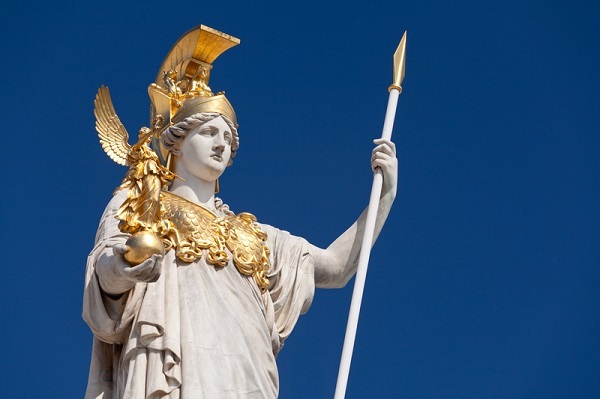

Athena is the Greek goddess of knowledge, courage, inspiration, civilization, law, justice, and power. She is also known as Pallas Athena. She is sometimes shown as a stately woman in armour clutching a spear or shield. She is the daughter of the ultimate deity, Zeus. Together with Artemis and Hestia, Athena is one of the three virgin goddesses and one of the most significant gods in Greek mythology. She was many heroes' defenders, including Odysseus and Heracles, and was linked to various symbols, including the owl and the olive tree.
Athena was born from her father Zeus's head. According to legend, Zeus allegedly swallowed his first wife, Metis, while she was carrying their child. Zeus was forewarned by the oracle that he would be toppled by his own son, and he feared that the kid would be a son and overthrow him. Zeus swallowed Metis to stop this from happening, and it wasn't until Prometheus the Titan intervened that he was able to free Athena from his skull. Athena, who frequently appears with her shield and spear, emerged fully grown and armoured.
Athena was the patron goddess of many towns, including Athens, Sparta, and Thebes. She was a guardian of the creative industries and frequently appeared with a spindle and weaving implements. In addition, Athena, who was connected with the owl and the olive tree, was the protector of heroes like Heracles, Perseus, and Bellerophon.

Athena
Athena, goddess of greek mythology, symbol for law and justice
Athena was honoured as the city's patron deity and was associated with its patron goddess, Neith. Athena was the goddess of the Acropolis and was often referred to as Athena Polias, the goddess who protected the city. The Erechtheum served as Athena Polias' temple, which was in charge of guarding the city. Athena was also the patron of the Panathenaic Games, which were conducted in her honour every four years.
Athena is a renowned deity of knowledge, sound advice and astute warfare. She is the matron goddess of Athens, whose name is synonymous with the city, and is symbolised by the olive tree, olive oil, and owl. Additionally, Athena is venerated as the divine protector of crafts and weaving. It is believed that she invented the flute and taught people the art of fabric weaving.
Athena as the Goddess of War
Athena, often depicted in statues wearing armour, is revered as the goddess of war and protector of soldiers. She is believed to have fought alongside the Greek gods during the Trojan War and is typically shown with her shield and spear. Additionally, Athena is seen as a guardian of cities.
Athena as the Goddess of Justice
The ancient Greeks revered Athena as both the goddess of justice and the giver of eloquence. She was believed to preside over legal matters from her temple in Athens and grant fairness in disputes among mortals. She is typically depicted with a set of scales, signifying her aptitude for balancing justice. Athena also gave Odysseus the gift of eloquence in Homer's Odyssey.
Medusa is a well-known figure from Greek mythology, renowned for her monstrous appearance which featured a head full of snakes. According to the myth, Medusa was once a beautiful woman but was cursed by the goddess Athena for her vanity and pride. As punishment, Athena transformed her into a Gorgon, a fierce creature with a terrifying gaze that could turn onlookers to stone. Medusa was then sent to live in a temple at the edge of the world and guarded by a dragon, making her so daunting that no one dared to look at her. Over time, Medusa's story has become an archetype for powerful female figures, and she has come to be viewed as a symbol of strength and resilience.
Athena is one of the most significant and influential goddesses in Greek mythology. She served as the patroness of several places, including Athens, and was linked to a number of icons, including the owl and the olive tree. She was also a fierce defender of numerous heroes and a key figure in the Medusa and the Gorgons tale. One of the most significant goddesses in Greek mythology, Athena is known for her birth from the head of Zeus, patronage of the arts and crafts, and protection of the city of Athens.
Q1. What happened to Athena after she defeated Poseidon and won the contest of wisdom?
Ans. Athena was then declared the patron deity of Athens, and the Parthenon was erected in her honour. She was revered as the goddess of civilization, law and justice, strategic warfare, mathematics, strength, strategy, the arts, crafts, and skill. She was also known for her knowledge, strength, and innovation.
Q2. Is there a connection between Athena and modern-day liberalism or conservatism?
Ans. No, there is no direct connection between Athena and modern-day liberalism or conservatism.
Q3. What was Athena's relationship with Zeus?
Ans. Athena was the daughter of Zeus, born from his head after he swallowed her mother Metis.